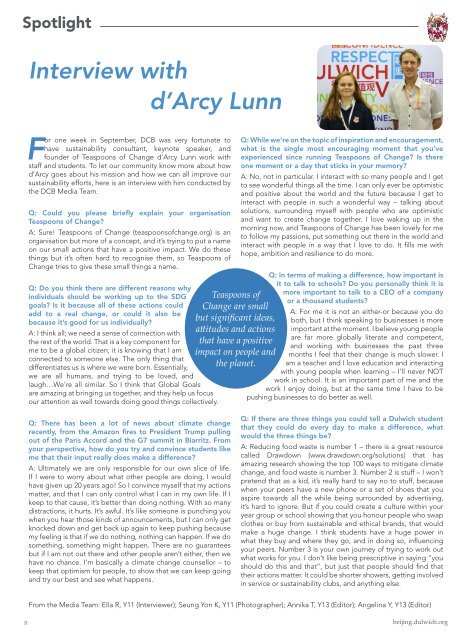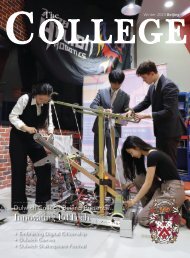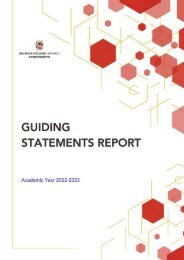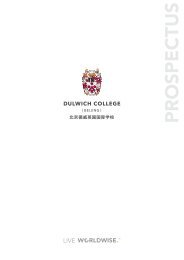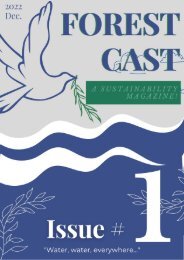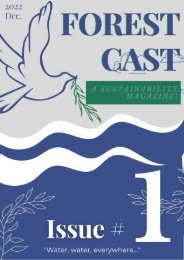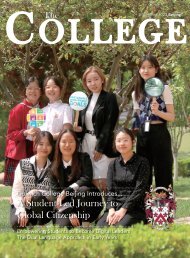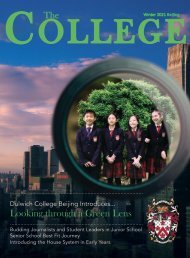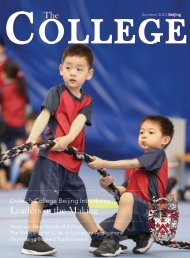The College Magazine Winter 2019
Term 1 of the 2019/2020 Year at DCB: World Record Largest Environmental Sustainability Lesson - Cross-Curricular Learning - Yunnan Service Trip - Laos Service Trip - Worldwise Academy - Photo Competition - Five Bad Habits to Eliminate - Mindfulness in Early Years - International Mindedness
Term 1 of the 2019/2020 Year at DCB: World Record Largest Environmental Sustainability Lesson - Cross-Curricular Learning - Yunnan Service Trip - Laos Service Trip - Worldwise Academy - Photo Competition - Five Bad Habits to Eliminate - Mindfulness in Early Years - International Mindedness
Create successful ePaper yourself
Turn your PDF publications into a flip-book with our unique Google optimized e-Paper software.
Spotlight<br />
Interview with<br />
d’Arcy Lunn<br />
For one week in September, DCB was very fortunate to<br />
have sustainability consultant, keynote speaker, and<br />
founder of Teaspoons of Change d’Arcy Lunn work with<br />
staff and students. To let our community know more about how<br />
d’Arcy goes about his mission and how we can all improve our<br />
sustainability efforts, here is an interview with him conducted by<br />
the DCB Media Team.<br />
Q: Could you please briefly explain your organisation<br />
Teaspoons of Change?<br />
A: Sure! Teaspoons of Change (teaspoonsofchange.org) is an<br />
organisation but more of a concept, and it’s trying to put a name<br />
on our small actions that have a positive impact. We do these<br />
things but it’s often hard to recognise them, so Teaspoons of<br />
Change tries to give these small things a name.<br />
Q: Do you think there are different reasons why<br />
individuals should be working up to the SDG<br />
goals? Is it because all of these actions could<br />
add to a real change, or could it also be<br />
because it’s good for us individually?<br />
A: I think all; we need a sense of connection with<br />
the rest of the world. That is a key component for<br />
me to be a global citizen; it is knowing that I am<br />
connected to someone else. <strong>The</strong> only thing that<br />
differentiates us is where we were born. Essentially,<br />
we are all humans, and trying to be loved, and<br />
laugh…We’re all similar. So I think that Global Goals<br />
are amazing at bringing us together, and they help us focus<br />
our attention as well towards doing good things collectively.<br />
Teaspoons of<br />
Change are small<br />
but significant ideas,<br />
attitudes and actions<br />
that have a positive<br />
impact on people and<br />
the planet.<br />
Q: While we’re on the topic of inspiration and encouragement,<br />
what is the single most encouraging moment that you’ve<br />
experienced since running Teaspoons of Change? Is there<br />
one moment or a day that sticks in your memory?<br />
A: No, not in particular. I interact with so many people and I get<br />
to see wonderful things all the time. I can only ever be optimistic<br />
and positive about the world and the future because I get to<br />
interact with people in such a wonderful way – talking about<br />
solutions, surrounding myself with people who are optimistic<br />
and want to create change together. I love waking up in the<br />
morning now, and Teaspoons of Change has been lovely for me<br />
to follow my passions, put something out there in the world and<br />
interact with people in a way that I love to do. It fills me with<br />
hope, ambition and resilience to do more.<br />
Q: In terms of making a difference, how important is<br />
it to talk to schools? Do you personally think it is<br />
more important to talk to a CEO of a company<br />
or a thousand students?<br />
A: For me it is not an either-or because you do<br />
both, but I think speaking to businesses is more<br />
important at the moment. I believe young people<br />
are far more globally literate and competent,<br />
and working with businesses the past three<br />
months I feel that their change is much slower. I<br />
am a teacher and I love education and interacting<br />
with young people when learning – I’ll never NOT<br />
work in school. It is an important part of me and the<br />
work I enjoy doing, but at the same time I have to be<br />
pushing businesses to do better as well.<br />
Q: <strong>The</strong>re has been a lot of news about climate change<br />
recently, from the Amazon fires to President Trump pulling<br />
out of the Paris Accord and the G7 summit in Biarritz. From<br />
your perspective, how do you try and convince students like<br />
me that their input really does make a difference?<br />
A: Ultimately we are only responsible for our own slice of life.<br />
If I were to worry about what other people are doing, I would<br />
have given up 20 years ago! So I convince myself that my actions<br />
matter, and that I can only control what I can in my own life. If I<br />
keep to that cause, it’s better than doing nothing. With so many<br />
distractions, it hurts. It’s awful. It’s like someone is punching you<br />
when you hear those kinds of announcements, but I can only get<br />
knocked down and get back up again to keep pushing because<br />
my feeling is that if we do nothing, nothing can happen. If we do<br />
something, something might happen. <strong>The</strong>re are no guarantees<br />
but if I am not out there and other people aren’t either, then we<br />
have no chance. I’m basically a climate change counsellor – to<br />
keep that optimism for people, to show that we can keep going<br />
and try our best and see what happens.<br />
Q: If there are three things you could tell a Dulwich student<br />
that they could do every day to make a difference, what<br />
would the three things be?<br />
A: Reducing food waste is number 1 – there is a great resource<br />
called Drawdown (www.drawdown.org/solutions) that has<br />
amazing research showing the top 100 ways to mitigate climate<br />
change, and food waste is number 3. Number 2 is stuff – I won’t<br />
pretend that as a kid, it’s really hard to say no to stuff, because<br />
when your peers have a new phone or a set of shoes that you<br />
aspire towards all the while being surrounded by advertising,<br />
it’s hard to ignore. But if you could create a culture within your<br />
year group or school showing that you honour people who swap<br />
clothes or buy from sustainable and ethical brands, that would<br />
make a huge change. I think students have a huge power in<br />
what they buy and where they go, and in doing so, influencing<br />
your peers. Number 3 is your own journey of trying to work out<br />
what works for you. I don’t like being prescriptive in saying “you<br />
should do this and that”, but just that people should find that<br />
their actions matter. It could be shorter showers, getting involved<br />
in service or sustainability clubs, and anything else.<br />
From the Media Team: Ella R, Y11 (Interviewer); Seung Yon K, Y11 (Photographer); Annika T, Y13 (Editor); Angelina Y, Y13 (Editor)<br />
8 beijing.dulwich.org


